| Family Life A Fire Brings the Community Together College Years A Time of Waiting A Time of Parting |
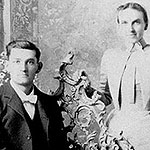 Gene's father and mother - Perry & Ada V. Lahman Blosser |
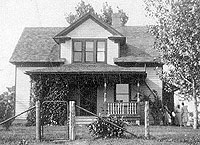 Gene's home, built by his father in 1916. Gene was the first child, born here on March 27, 1917. |
My elementary education took place in a little one room school that stood one and one quarter miles from our home. I graduated from that school in 1930, and that autumn I entered high school at South English. In the middle of only my second year in high school I dropped out to help my father on the farm.
My father was a man of many skills. He was a carpenter, a part-time farmer on a thirty acre farm who also owned a steam engine, a threshing machine, a clover huller, and a saw mill. The boys in our family learned many things as we worked with our father at many different tasks. This learning proved very valuable in later life. The numerous tasks on the small farm we had fell to the boys who remained at home. The older boys and our father worked away from home at other tasks. Of course, we all had our chance to work on the saw mill at one time or another, which included a lot of heavy work such as handling logs and carried heavy beams and boards away as they were being produced from the saw. We also gleaned much wood from the scraps of the logs which were cut up and used for fuel at home in the stove and in the furnace.
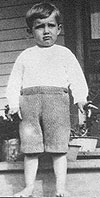 Gene - 4 years old. |
My earliest recollections of family dining are that there were 10 of us around the table at every meal, and so many mouths required an abundance of food. Our mother and sisters did a lot of canning and other types of preservation during those early years. In addition, there was baking of bread twice a week, an enormous amount of laundry to be done, constant mending of clothing, and the general cleaning of the house. All of these things took a great deal of time and energy.
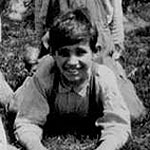 Gene, first row far right. Brother Amos is behind him, at school. |
Our father was usually able to repair those things that broke, especially if those things happened to be made of wood. Watching and helping him work was an education in itself, at least it was of a certain kind. Unfortunately, neither my brothers, nor I finished high school, at least not at the time when it should have been done. Several of us were able to get high school equivalency certificates in later years through further study, or by taking General Educational Development tests.
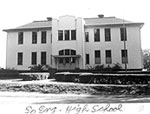 High school at South English, Iowa, which Gene attended from 1931-1932. High school at South English, Iowa, which Gene attended from 1931-1932. |
Our father was away from home so much with his varied occupations that our mother carried a heavy load much of the time. She had us help with the work and worked with us so that we learned how to do things. She was a very small woman, but was able to do many things well. She was only 5 ft tall and never weighed over 140 pounds. Yet, in spite of her small size, we children had the deepest respect for and loved her dearly, and we never doubted her love for us.
I remember when our Aunt and Uncle came to see us from Tennessee, bringing two of their teenage sons were with them. My older brothers and our cousins enjoyed many happy times together. During our cousins' stay, they often made earthen dams across the creek that ran through our pasture field. When the water filled in behind the dam they had a good place to swim, which they did often, all summer long. Yet, finally the day came when we had to say our good-byes to our cousins. The cousins were dressed and ready to leave, but someone mentioned one more swim! The boys were off to the creek, but not without warnings from their mother to keep their clothes clean and dry, so they were careful to place their clothes a safe distance from where they swam. It was so much fun, but the time eventually came for them to really have to go. Cecil, one of the cousins, had dressed already, but Oren, my brother, was ready to dive in one more time. Cecil ran to give him a push, but Oren went a little too quickly, and lost his balance. When Oren came out of the water, there stood Cecil right in the middle of the pool, waist-deep in water, with his good clothes soaking-wet. What a mess!
During the depression years following the 1929 economic crash everyone seemed to become poor, and our own family situation was such that we all had to contribute to the general living expenses. My older brothers and sisters found themselves working away from home in there late teen years. I recall that my slightly older sister did house work for another family for $3.50 per week. I was still quite young at the time, but I remember working for a neighbor one winter for $7.50 per month. So, we all worked together in order to pay the bills for the family. Everyone was so poor that our father often found himself without work because no one was able to pay him to do work for them. This made it very difficult for us to meet family expenses. Mother patched our overalls until they had patches on the patches, but since everyone else seemed to be in the same sort of situation, no one could ridicule anyone else.
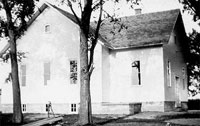 Church at St. English, where most of Gene's siblings "grew to adulthood and learned to know the Lord" Church at St. English, where most of Gene's siblings "grew to adulthood and learned to know the Lord" |
On New Year's day, 1933, on a cold winter night, when we were about ready to leave to go to Church, an alarm was sent out on the telephone lines announcing that the Mennonite Church was on fire. We all grabbed buckets and hurried to the church. Soon, a large crowd had gathered. The building that was our place of worship was full of smoke, and fire soon broke out on the roof. We had no fire departments in those days, and no water source available, so all we could do was watch it burn. Someone said that we had never had such a large crowd at church before, and someone countered, "Your Church was never on fire before." We all returned home that night feeling as though there was a big hole in our hearts. How could we possibly rebuild when we were in the depth of a depression?
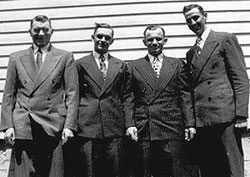 Pastor and three young men at church - Gene is second from right. Pastor and three young men at church - Gene is second from right. |
Quickly, members' meetings were held in order to decide what to do. The growing conviction was that somehow we had to rebuild. This question was raised, "Should we rebuild on the same site or in the town of South English?" Some felt strongly that we should build in the town of South English, while others felt the old site was best. The matter was discussed for several days, and then a vote was taken. It was decided that we should build at the same site as before. Until the new church could be rebuilt, however, the local Baptist Church in South English (called Weeping Water Baptist Church), which had no pastor at the time, kindly invited us to come and have our church activities at their facility.
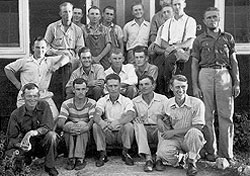 Gene - Dorm group at CPS University at Weeping Water, NE. In soil conversation work for 9 months. Gene - Dorm group at CPS University at Weeping Water, NE. In soil conversation work for 9 months. |
At Weeping Water we became involved in soil conservation activities such as filling gullies and ditches which were a result of erosion. Also, we created sodden waterways and diversion dikes in order to hinder the erosion from happening again. During the winter months of 1942 and 1943, my crew was sent to a large farm near Nebraska City where an entire orchard had been killed by the Armistice Day storm of 1940. The trees had all been cut and the tops cleaned up, but there were still all of those stumps. So, they put us to grubbing out those stumps with pick and shovel during the winter months when the ground was frozen like a rock. It was a miserable job, but we understood that it needed to be done.
My brother Amos, who had gone with me to Weeping Water, signed up to go into forestry service in Belton, Montana, but that call for men was full before I could get there.
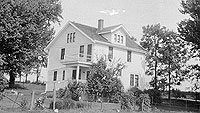 The farm where Grandpa worked during his years in the Wisconsin Civilian Public Service. The farm where Grandpa worked during his years in the Wisconsin Civilian Public Service. |
We arrived in the beautiful City of Madison, Wisconsin on a sunny morning that bore a cold North-West wind blowing off the lake that was located just north of the center of town. We entered the government building where we had been instructed to go, and the farmers came there to select the men they wanted to work for them. Some went to work for commercial dairies, while others went to individual farmers. The man who chose me was Rudy Roethlisberger from a town called Verona that was just west of Madison by about ten miles. I lived with him, his wife, two daughters, and a young son. One daughter was already working, and the second was just graduating from high school.
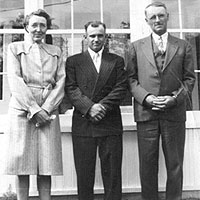 Grandpa with his Wisconsin 'parents', whom he worked for while in Civilian Public Service during World War II (1943-46). Grandpa with his Wisconsin 'parents', whom he worked for while in Civilian Public Service during World War II (1943-46). |
After working there a couple of years, I became aware that the Lord was calling me. He was asking me to go and prepare for the work that He wanted me to do. The Lord did not just speak to me once, but came back again and again. My response was, "Lord, you know that school was always hard for me. I have not finished high school, and I am already twenty-seven years old. You know how painfully bashful I have always been, and I am not a gifted speaker." The Lord did not seem impressed with my arguing.
About that time, at the invitation of the family I was working for, my parents came to visit me in Wisconsin. They came on a week end when we would have some time to visit. My father was also invited to preach at the Baptist Church where we attended. I shared with my father my call I was experiencing in my heart, and both of my parents encouraged me to do as the Lord was calling me to do. I also talked with church people there and at home when I was on leave. Some encouraged me, while others were quite discouraging, which I could well understand. However, because of the Lord's persistence in His call, I determined to follow His leading. Aware of many difficulties ahead, I set my mind to obey what the Lord was telling me.
Soon after my decision was made, I learned of the General Educational Development Tests. They were made available to veterans, and to older people like myself who wanted to extend their educations. Our CPS Director said he would administer them for me, and my boss, Rudy, told me that I could have some days off to take the tests during the winter months. My director rented a hotel room in Madison so that we could have a quiet place to work, and believe me, those tests were a grind. I had been out of school for twelve years, but when the reports returned, the percentile was very good. This was an encouraging sign, and I felt that the Lord was with me.
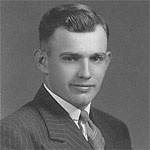 Gene - 25 years old. Gene - 25 years old. |
I then applied to enter Goshen college when I was released from my work contract in June of 1946. This timing was due to the accelerated program for students coming out of service situations like myself. It was understood that we were growing older and wanted to get on with our lives. In March of 1946 I was released from the draft. Rudy asked if I could stay on until the end of May to help until corn planting was finished. I consented to do that for him. This did not give me much time between the end of May and my beginning studies at Goshen College, but it did provide more needed funds for my education. I was convinced in heart that the Lord was providing for me.
In June of 1946 my college career began, something I never expected to undertake, and it was with much apprehension that I began my class work. The Lord was wise to show me what was ahead in little bits and pieces. If I had known the struggles that lay ahead, the Lord would have had a much more difficult time convincing me to go down the road that He chose. Yet, as one moves ahead step by step, He strengthens, encourages, guides, gives grace, and grants resources that I never imagined could be made available.
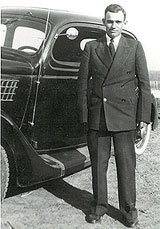 Grandpa standing beside his brother Amos' car ('35 model Ford) about 1939 or 1940. Grandpa standing beside his brother Amos' car ('35 model Ford) about 1939 or 1940. |
What a marvelous Father we have Who helped this poor farm boy overcome such limitations in the unfamiliar world of College, and Who gave me the will, determination, and faith to go and accomplish what had appeared to be the impossible. I could not have done it without the Lord!
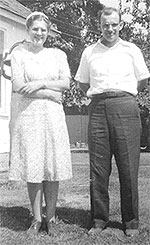 Gene & Louella during their college years, before they were married. Gene & Louella during their college years, before they were married. |
On June 6th, 1949 I received my Bachelor of Arts Degree in Bible from Goshen College. It was a great day in my life, and I experienced a real feeling of accomplishment. My brother Dwight and other family members were present for the occasion. I was sorry that my parents could not be there as well, but I understood how travel would have been difficult for them.
After graduation I returned to Iowa to make preparations to go to China. The Mission Board had already given me written and oral examinations for my preparation to serve with the Board. They had given their approval for my going to China pending the circumstances there.
Very soon after my return to Iowa, the Annual Mission Board Meeting was held in Hesston, Kansas. It was expected, of course, that I would be there for the appointment of a large group of young people who were prepared to go out all over the world, and to be appointed by the Church at this time. My mother and Sister, Abbie, went with me to this meeting. It was a very impressive event, with so many youth of the Church being commissioned for service in so many parts of the globe.
Our world had suffered so much during the war years, and these young people felt that they needed to give hope to so many suffering people. The challenge of the church during those days was strong and we were called to go and make a difference through sharing the Gospel of Christ, Our Saviour. Many of us would not meet again for many years, as our furlough schedules would not easily coincide.
Another test of my faith came because of the political situation in China producing much instability in this country at that time. Communists had been making considerable progress in the occupation of large sections of east China. Consequently, our Mission Board was vacillating about sending me to China too hastily. There were good reasons for their hesitancy, and it was for these reasons that they had recommended earlier that they send me to India, then have Louella meet me there. As I said earlier, Louella was not totally in agreement with that decision, but tried hard to be submissive to the will of the group. The Board was taking all of this very advisedly and moving with necessary caution.
Consequently, the Mission Board response to this was to put me on a waterman freight ship, departing from Mobile Alabama, with a trip through the Panama Canal, finally leaving August 2nd, and arriving in Hong Kong on Sept 15th. In other words, this was a very slow boat to China! My contact person in Hong Kong was to be William Voth of MCC, Hong Kong. The situation would be assessed upon my arrival and plans were to be made accordingly. So, my goal was to get my papers in order, and to get to my intended destination by August 2nd. In the mean time, the Board asked my church in Iowa to make plans for my ordination as soon as possible. My home church in South English made plans with the Iowa-Nebraska Conference Bishops who did the ordaining in our Conference. My ordination was planned for the 17th of July, 1949 at my home church. I appreciated the Conference and the Bishops for the trust they had in me to carry out this ordination without hesitation.
Two of my brothers and their families made plans to take me and our parents to Alabama to see me off on the ship. We were to leave on the following Monday evening. Sunday, we attended Gulf Haven Mennonite Church. My parents had friends there who had formerly lived in South English. My older brothers knew the people, but I had been too young when they were there, and I did not remember any of them. I was asked to give the message that morning at Church, it was a good experience for me to share with those people, and to learn to know them, as we would meet later.
On Monday we drove over to Mobile to learn where the Madaket, my ship, would be boarded. We had to go to the shipping Company offices to see that my papers were all in order. We had time to look around the City for a while, and I found a shady spot where I could put the necessary labels on my luggage. The heat of the South was very oppressive to us. This made the wait until boarding time a long one.
This was a very difficult experience for my parents to witness the departure of their son off to a distant land that they knew almost nothing about. They also realized that they might never see me again, and they had very mixed emotions that day to be sure. They were glad that I was going, but they were very uncertain about the future. My mother was the one who had the most difficulty, and one of my brothers told me years later that after the ship had left the dock, she would not leave until my had ship disappeared over the horizon. If my term of service had not been cut short by the Communist Government, they would not have seen me again, but the Lord was merciful to us, and made it possible for us to meet again, and for them to see our son, Philip, who was born in China. How we all rejoiced.
Mail between The US and China was very intermittent that summer, not because we did not write, but because letters seemed to get lost on the way, or were simply not delivered at all. I had not heard from Louella for more than a month before I left the US. I was not sure whether I would find myself in India or in China, nor where Louella and I would next meet each other. We were living with a lot of anxiety that summer, but deep down in our hearts we had the assurance that things would work
The Madeket, on which I was crossing the Pacific Ocean,1 was a good ship, and had comfortable rooms. I shared one with a young man named Jim Phillips, who was just out of Yale University, and was on his way to Korea as a missionary. We passed through the Panama Canal into the Pacific Ocean. From there we headed north-west toward the Hawaiian Islands and to the harbor at Honolulu. The crew spent one day unloading freight, and another day loading freight for points west.
After many days seeing lots of water, many flying fish sailing from one wave crest to another, and porpoises leaping from wave to wave, plus an occasional whale spouting water, we saw the Island of Guam coming into view. There again, we had a couple days while freight was unloaded and loaded. We were given passes to leave the ship during the day, but were expected to return to the ship for the night. I should have mentioned that while crossing the Pacific and the International Date Line, we lost one day going west. That day, Rosalie Stoltzfus lost her birthday. But, unfortunately, when going east you have two days going east with the same date. Consequently, when flying east by Jet plane, one arrives in the US before one leaves Japan-- some interesting travel trivia.
Our next stop was the Philippine Islands where I received two letters from Louella. What a surprise! In one letter she told me that she was in Hong Kong awaiting my arrival. Now we were only five days away from Hong Kong, but with two days in Manila, that amounted to a week. I opened the other letter, and a news paper clipping fell out. It was an announcement that she and I would be married on the19th of September, just four days from the time I would arrive there. Wow, what news! That seemed little more than a breath away! The wedding would take place at St. John's Anglican Church in the Lady Chapel. Louella then went on to explain the problems she had encountered. She had learned that in Hong Kong, weddings must be announced seventeen days in advance, and that we did not have that many days. She needed to get special permission from the Governor to have the wedding earlier. She had also become aquainted with a man who was an Anglican Missionary from Suchwan Province in China where our work was located, but who was now in Hong Kong, in charge of a Children's Hostel. She had asked him if he would conduct our wedding on the19th of September, which he readily consented to do. The situation called for early planning, so she went ahead and made plans, trusting that I would approve. The next five days from Manila to Hong Kong were indeed long ones for me. That ship seemed slower than ever as it plowed through the waves of the South China Sea. We arrived on schedule, but it had been two years plus since we had seen each other.
William Voth, the man whom I was to contact in Hong Kong, and Louella came out together to meet me in the harbor. There was no dock open for our ship, so our ship had to anchor with others in the harbor. It was a most welcome sight to see them approaching our ship. As Louella came up the stairs and reached the top, there was a big embrace, with a crowd of interested viewers looking on, but after two years, who cared? Dan and Rosalie had known her in College, but I introduced her to the other missionaries on board, and other friends. What a day and what a Blessing!
Louella had reserved a special place for me in the men's dormitory in the Guest House where she was staying. The next days were extremely busy ones, as we made plan and preparations for our wedding . Those plans were center stage for all our activities until the designated hour of 4:00 PM on the 19th of September. There was one thing about our special day that made history in the Church of England. They require a wedding ring in their ceremony, and at that time, rings were not allowed to good Mennonites. Rev. Mulrenin insisted that he had known of no other wedding in the Church of England that had taken place without a ring.
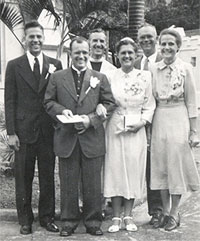 Grandpa & Grandma Blosser married on September 19, 1949, by Rev. Mulrenin at St. John's Cathedral, Hong Kong. Grandpa & Grandma Blosser married on September 19, 1949, by Rev. Mulrenin at St. John's Cathedral, Hong Kong. |
Rev. Mulrenin had asked me for a copy of our Churches Ceremonies. He said, "If your Church forbids you to use a ring, then it would be a sin if you used one. I will contact our Bishop in Hong Kong and ask for permission to perform the wedding without a ring." The reply from the Bishop came soon. The Bishop said, "Yes, I believe it will be all right for you to perform the ceremony for these people without a ring, for I understand that Mennonites Baptize and believe in the Trinity." We thought, "How interesting!" We were thankful that he was willing to have us go ahead with our plans.
Our wedding took place as planned on September 19th at 4:00 PM. After the signing of our papers, many thank-you's, the taking of pictures, and, finally, good-bye's to our guests, we were off in a waiting taxi that took us to Castle Peak and to Dragon Inn, where we spent several days alone at a very beautiful spot, and did some catching up on all that had happened in our lives during those long years of absence from each other. It was Marvelous!
Twenty-eight guests had attended our wedding, mostly Missionary friends of Louella's who were on their way out of China, and a few friends who were living in Hong Kong. Our attendants were Dan and Rosalie Garber Stoltzfus, who had accompanied me on the ship to China. There were also some MCC workers who were there. It was really a great event for us, and we were grateful to God and to all of those who helped to make it possible. After those few days together, we returned to the Guest House where we had been staying earlier. We were there two nights before we finally left to enter China, the first time for me and the second for Louella. We got our baggage together and made final clearance for our flight to Chungking. Our ten days together in Hong Kong went by so quickly, and so much was packed into them, that they almost seemed like a dream that passed all too quickly. But, I would hasten to add that the Lord had many good and wonderful years in store for our future, and we were anticipating them.